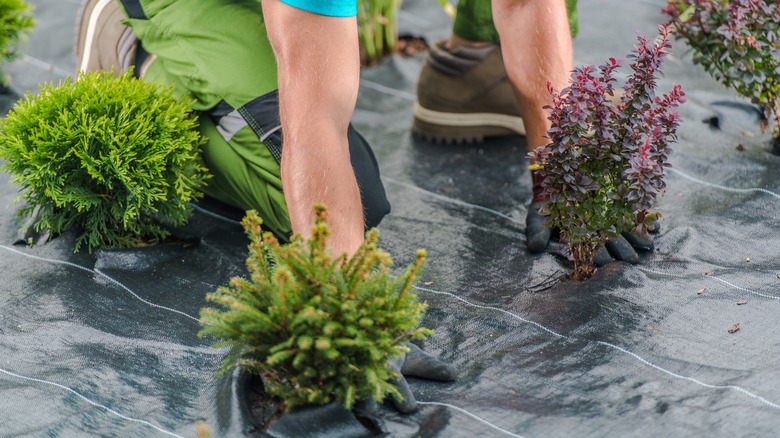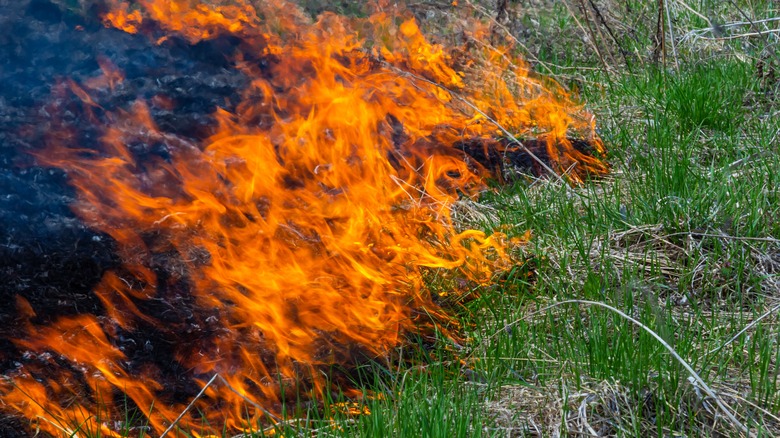Should You Really Be Using This Fiery Tool In Your Garden Landscaping?
If you've been on the gardening and farming side of TikTok recently, you may have noticed videos showing how to use a blowtorch to burn holes into landscape fabric in a short amount of time. Shrubs and crops can then be planted into those holes and surrounded with mulch. It may seem like this method is far too dangerous to even consider, but using a propane torch is actually a common way of preparing landscape fabric for yards. In fact, it's even recommended by credible organizations including the South Dakota State University Extension. However, it's important to note that this hack still comes with risks and potential drawbacks.
One of the easiest and quickest ways to prevent weed growth in your yard is by using landscape fabric, which is generally made out of a polypropylene woven mesh. Depending on the thickness, this material could last anywhere from months to even years. The plastic fabric acts as a barrier, preventing most weeds from growing through it. Landscape fabric does have environmental downsides, but most types are safe to use in vegetable gardens as well as in flower gardens and landscaping. Of course, if you want plants to grow around the landscape fabric, you have to create holes for those plants to grow through. While some homeowners create the holes with sharp blades, others use a blowtorch.
How to use a propane torch on landscape fabric
Once landscape fabric is placed in the garden, it can be challenging to reach the soil underneath it, so remember to add any required amendments for your garden before putting it down. Then, lay the weed barrier fabric down and secure it with landscape staples or stakes. Once the fabric is in place, you'll want to think about where the holes for your plants should go. If you want neat, perfectly-spaced rows, you may find it useful to create a wooden template to follow. You can create holes that are about 2 to 3 inches in diameter, as that will provide enough room for your plants without creating too much extra space for weeds to grow through.
You can then either cut or burn the holes into the fabric. While both methods work fine, burning holes in landscape fabric is a popular strategy for larger gardens because it takes much less time. Further, the heat cauterizes the edges of the fabric, which keeps it from fraying. To burn the holes, you can simply turn on the propane torch and hold it over the section you want to burn until the fabric disintegrates, then quickly turn off the torch. If you opt to cut holes instead, it's simplest to cut an X shape and fold the extra fabric underneath. At the end of the gardening season, you can remove the landscape staples and roll up your fabric to use next year.
Drawbacks of burning holes in landscape fabric
There are already environmental concerns with landscape fabric in general, given that it is made of plastic fibers. Burning it only increases these concerns, as burning plastic negatively impacts air quality. While polypropylene, the material that most landscape fabrics are made of, is generally considered one of the safer plastics for use with foods, there is still some evidence linking it to possible health problems for humans. Additionally, burning polypropylene is known to cause eye irritation. Some landscape fabrics can also be made of other materials, including polyester, which is known to release harmful toxins when burned. Be sure to read the label on your specific type of weed barrier and know what it is made of before you consider burning it.
If you opt to burn holes in your landscape fabric, be sure you are aware of the fire danger level in your community before beginning, and make sure you can safely have an open flame. Remember to use caution and ensure that there isn't any dry brush nearby that could ignite. Take time to familiarize yourself with your propane torch and check it for damage before use. Personal protective equipment is a must around propane torches as well, so always wear safety glasses and gloves as well as nonflammable long sleeves.

